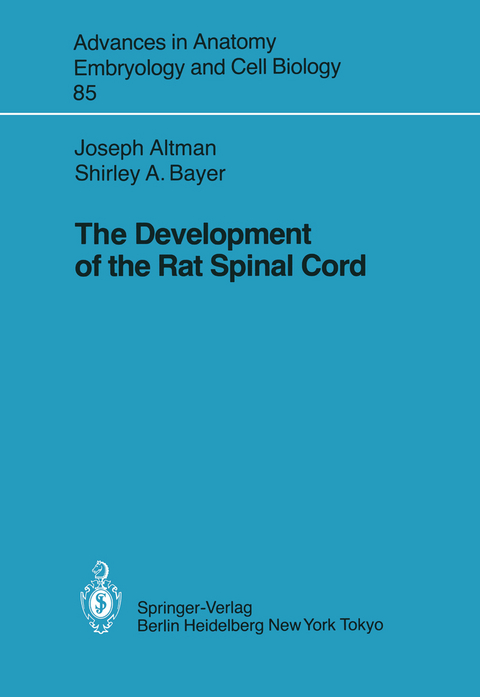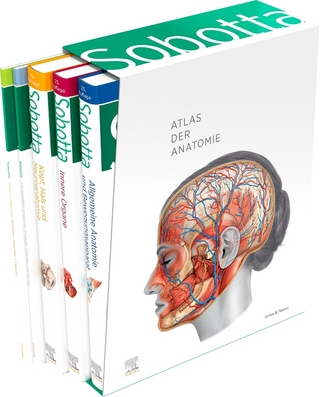
The Development of the Rat Spinal Cord
Springer Berlin (Verlag)
978-3-540-13119-9 (ISBN)
1 Introduction.- 2 Materials and Methods.- 2.1 Whole-Body Long-Survival (Late Fetal) Thymidine Radiograms.- 2.2 Spinal Cord Long-Survival (Adult) Thymidine Radiograms.- 2.3 Whole-Body Short Survival Thymidine Radiograms.- 2.4 Methacrylate-Embedded Embryos.- 3 A Survey of the General Features of the Spinal Cord and Its Development.- 3.1 Organization of the Spinal Cord.- 3.2 Development of the Spinal Cord.- 4 Development of Motor Neurons and the Growth of Ventral Root Fibers.- 4.1 Time of Production of Large Motor Neurons.- 4.2 Maturation and Columnar Segregation of Motor Neurons.- 4.3 Growth of Motor Fibers and Their Penetration into Somites and Limb Buds.- 4.4 Time of Origin and Maturation of the Preganglionic Motor Neurons.- 5 Development of Sensory Neurons and Growth of the Dorsal Root System.- 5.1 Time of Origin of Dorsal Root Ganglion Cells.- 5.2 Sites of Origin of the Dorsal Root Ganglia and the Spinal Boundary Caps.- 5.3 Maturation of the Dorsal Root Ganglia and of the Boundary Caps.- 5.4 Segmentation of the Boundary Caps and Dorsal Root Ganglia and the Growth of Distal Sensory Fibers.- 5.5 Growth of the Dorsal Root Fibers and of the Dorsal Funiculus.- 6 Development of Relay Neurons: The Contralaterally and Ipsilaterally Projecting Cells.- 6.1 Time of Origin of Contralaterally and Ipsilaterally Projecting Relay Neurons.- 6.2 Transverse Microsegments of the Contralaterally and Ipsilaterally Projecting Relay Neurons.- 6.3 Identity and Settling Patterns of the Sequentially Produced Relay Neurons.- 7 Development of the Interneurons of the Dorsal Horn.- 7.1 Time of Origin and the Settling of the Interneurons of the Dorsal Horn.- 7.2 Time of Origin of the Interneurons of the Dorsomedial Gray.- 8 Development of Some Glial Components of the Spinal Cord.- 9 General Discussion.- 9.1 Development of the Transverse Organization of the Spinal Cord with Some Functional Considerations.- 9.2 Development of the Longitudinal Organization of the Spinal Cord with Some Functional Considerations.- 9.3 Some Guidance Mechanisms in the Growth of Spinal Afferents and Afferents.- 10 Summary.- 11 References.- 12 Subject Index.
| Erscheint lt. Verlag | 1.5.1984 |
|---|---|
| Reihe/Serie | Advances in Anatomy, Embryology and Cell Biology |
| Zusatzinfo | VIII, 168 p. 108 illus. |
| Verlagsort | Berlin |
| Sprache | englisch |
| Maße | 170 x 244 mm |
| Gewicht | 375 g |
| Themenwelt | Medizin / Pharmazie ► Medizinische Fachgebiete ► Neurologie |
| Studium ► 1. Studienabschnitt (Vorklinik) ► Anatomie / Neuroanatomie | |
| Naturwissenschaften ► Biologie ► Humanbiologie | |
| Schlagworte | Development • Rat • Ratte • Rückenmark |
| ISBN-10 | 3-540-13119-1 / 3540131191 |
| ISBN-13 | 978-3-540-13119-9 / 9783540131199 |
| Zustand | Neuware |
| Haben Sie eine Frage zum Produkt? |
aus dem Bereich


